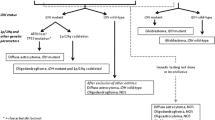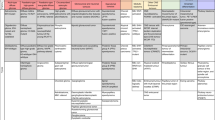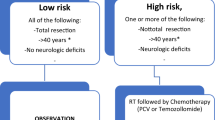Summary
Objectives. The purposes of the study were the assessment of the role of surgery in the suppression of epilepsy due to low-grade primitive cerebral tumours and the search for factors relevant to the surgical outcome.
Patients and Methods. Forty-eight patients with epilepsy due to low-grade supratentorial cerebral tumours were considered. They presented drug-resistant daily to monthly seizures since for least one year (mean 7 yrs). Twenty-four patients underwent a combined tumour and epileptogenic zone resection (“epilepsy surgery”) and 24 tumour resection alone (“lesionectomy”). The surgical outcome was evaluated two years after surgery. Several variables related to the characteristics of the epilepsy, the tumour and surgery, were considered for a possible association with the outcome. Statistical analyses were performed.
Results. Seizure freedom, including aura, was obtained in 35 patients (72.9%). Mild permanent complications occurred in 6 cases. Seizure suppression was significantly associated with complete tumour resection (post-surgical CT or MRI) and relatively low presurgical seizure frequency; it was also related, though not significantly, to small tumour size and histological grade I. The surgical outcome was only slightly better following “epilepsy surgery” than “lesionectomy”. However: i) the extent of tumour resection was not relevant regarding the “epilepsy surgery” outcome, while significantly influencing the outcome after “lesionectomy”; ii) the presurgical frequency of seizures and, to a less extent, the tumour size, had a higher influence on the outcome after “lesionectomy”.
Conclusion. Long-lasting and drug-resistant epilepsy due to cerebral tumours can be suppressed surgically in the majority of cases. The extent of tumour resection and the frequency of the seizures are the most relevant prognostic factors. Both “epilepsy surgery” and “lesionectomy” can provide good results. However, the two approaches should not be regarded as interchangeable: a choice of the approach based on the characteristics of seizures and of the tumour appears relevant to improve the surgical prognosis.
Similar content being viewed by others
Author information
Authors and Affiliations
Rights and permissions
About this article
Cite this article
Rossi, G., Pompucci, A., Colicchio, G. et al. Factors of Surgical Outcome in Tumoural Epilepsy. Acta Neurochir (Wien) 141, 819–824 (1999). https://doi.org/10.1007/s007010050382
Issue Date:
DOI: https://doi.org/10.1007/s007010050382




